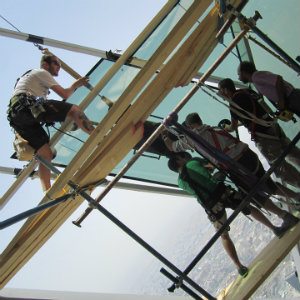While many people spend an entire winter talking about how they can’t wait for summer and hot weather, others, typically those who have chosen careers which require that they work outside, dread the thought of long hot days – and for good reason. While it might be nice to have a little warm weather and sunshine, too much can lead to painful and life-threatening injuries and illnesses.
How Hot Is Too Hot For Workers?

For example, in order to release heat and naturally cool the body, sweat is produced as internal heat rises. That sweat then evaporates and cools the body down. On extremely humid days, the sweat may not evaporate and the body will not cool. Or, if the wind is blowing, the sweat may dry so quickly that the worker doesn’t realize they have lost a lot of fluids and are in danger of becoming seriously dehydrated on top of overheating.
Generally, anytime that someone is working in temperatures of the 70’s, 80’s, and 90’s, they should take precautions to protect themselves.
How To Stay Safe In The Heat
There are steps that anyone can take to make sure they take care of themselves while working in hot weather:
Hydrate Before Work
Being hydrated before you are in a hot environment means that you are starting out on the right foot. Drink extra fluids at night before bed and prior to work if you know you will be working in the heat.
Keep A Water Bottle Close
Most people actually forget to drink the fluids they need to replace the ones they have lost if there isn’t a physical reminder. Keep a water bottle nearby so that you are visually reminded to continue drinking.
Drink Before You Are Thirsty
Thirst is the body’s way of informing you that you are already dehydrated. Prevent this by drinking every 15-20 minutes while in the heat.
Avoid Caffeine & Alcohol
Both caffeine and alcohol are diuretics, which means that they actually contribute to dehydration.
Snack On Fruits & Veggies
Both fruits and vegetables contain large amounts of water and can help to replace lost fluids.
Adjust Your Schedule
If you are able, work during the cooler hours of the day and avoid exposure to the sun.
Choose Your Clothing Wisely
Loose clothing that is breathable is best. Additionally, there are now sweat wicking materials that were manufactured with the intent to assist people with keeping cool.
Wear SPF
Sunburn is one of the most common ways in which an employee can become injured. If severe enough, the worker can suffer from sun poisoning, which can lead to swelling, fever, nausea, dizziness, headaches, and blistering skin. Burns can be prevented by wearing the correct clothing and slathering exposed skin with SPF.
Signs of Heat Exhaustion
Be aware of the signs of heat exhaustion not just for yourself but also for coworkers. Someone who is in danger may display the following symptoms:
- Excessively pale or flushed skin
- Headaches
- Nausea
- Weakness
- Loss of consciousness
How To Assist Someone Suffering From Heat Exhaustion
If someone is displaying the above symptoms, there are several ways that you can help them.
- Move them into a cool, dry place.
- Spray them with cool water or apply cool, wet towels to the skin.
- If they are awake, give them small amounts of cool water.
If they vomit, lose consciousness, or if they seem disoriented, call 911 right away. If an overheated worker isn’t cooled down immediately, they may suffer from heat stroke which is a life-threatening condition.
Are Their OSHA Standards Regarding Heat?
Yes. Employers are responsible for ensuring that all employees are working in a safe environment. Anyone who knows that their employees are going to be exposed to high temperatures should make sure that they are able to take breaks in a cool place, have access to water, and that new employees are given time to acclimate to the new environment.
Are Heat Related Illnesses Covered By Workers’ Compensation?
Yes. Workers’ compensation was designed to cover any accident or illness which occurs while working. This insurance may cover medical bills and even a portion of lost wages if the employee is unable to return to work for an extended period of time.